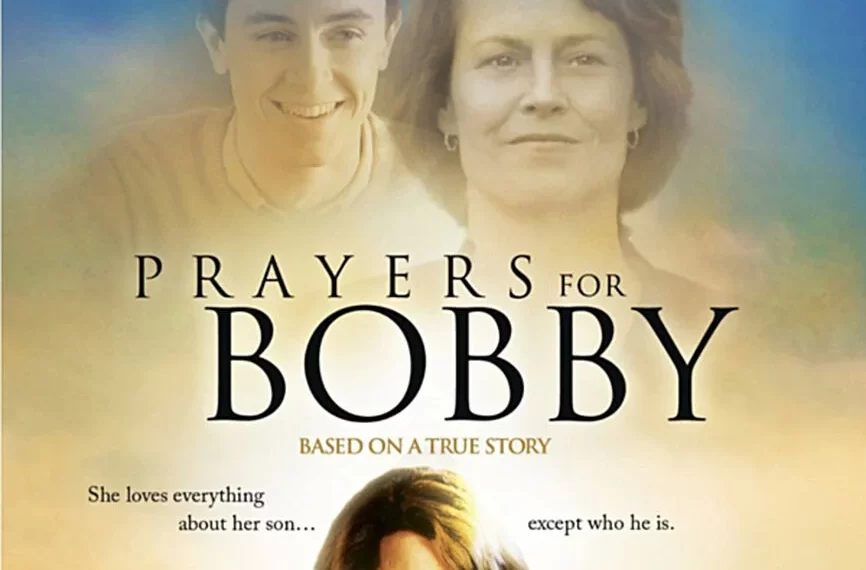Russell Mulcahy’s 2009 movie Prayers for Bobby is based upon a book, which in turn is based upon a real-life story, which is of course the most upsetting thing about it. Stream it at 123 Movies for free!
The movie follows young Bobby Griffith as he attempts to both deal with his problematic sexual feelings, and justify them to his strictly religious family, who follow what they believe to be the Bible’s teachings on homosexuality.
Bobby is sent to see a psychiatrist, who promises that his homosexuality can be cured (by means of diet and prayer!). When the “cure” does not work, and Bobby begins to be pestered at every turn by Bible-readings and injunctions of the “change your life” kind from his mother, he moves out of town.
Bobby finds a boyfriend, and develops emotionally and ethically – but thoughts of guilt and self-hatred continue to torment him, and when he can no longer deal with them he throws himself off a bridge into the traffic.
The movie’s second half focuses on the aftermath of this tragedy. Bobby’s mother (Sigourney Weaver) attempts to blame Bobby’s homosexual teachers and friends for his action, until she begins to realise that it was her own conduct that forced her son to take his life.
Distraught and tormented, Mary begins to think seriously for the first time about both sexuality and religion, and out of her emotional wreckage she forges the conviction that no other teenager must go through what her son went through. And so she joins the Gay Pride movement.
Ethical questions
Prayers for Bobby never quite becomes a great work of art, and it is beset by problems throughout. Most irritatingly, Mulcahy often allows his movie to morph into a work of propaganda – at the movie’s conclusion, one feels as though one is being lectured at about gay rights, and this is unpleasant, whatever one’s position on the actual issue.
Ethical issues also arise out of both the movie’s presentation of Christianity and its presentation of the gay community. While the first half of the movie envisages Christianity as claustrophobic and bigoted, the second half attempts to recuperate a “tolerant” version of the religion, which clings onto God but welcomes gays into its folds.
How one responds to this depends wholly on one’s own religious and ethical beliefs. To someone like me, who feels that Christianity constitutes an attack on basic ethics, the more positive, “tolerant” Christianity that Prayers for Bobby presents in its second half is unacceptable – it is no good to simply dilute Christian ethics where they do harm: the whole system must be ridiculed and rejected, if Enlightenment values are to triumph.
Gay stereotypes
The presentation of the gay community is also questionable. The stereotypes are rife here: we have seedy nightclubs, populated by drunk men looking for casual sex, as well as dancing drag-queens at Gay Pride, dressed in pink and purple, and waving fans. This is how popular culture always presents gays.
The problem is that this is a stereotype, and a large number of homosexuals do not dress in pink and look for casual sex. Prayers for Bobby demands tolerance for homosexuality, but the image of homosexuality that the movie presents is exclusive, and biased – indeed it is possibly, in part, a heterosexual fantasy. What does the movie wish to do about gays who want to be accepted, but don’t want to dress in pink?
Where Prayers for Bobby is refreshing is that it demands that one raise questions like these, and attempt to answer them seriously. This is not a movie that one can watch for its aesthetic merits alone: one is ethically involved (and implicated) at every moment, and a large part of responding to the movie involves interrogating oneself as to one’s own positions on sexuality and religion.
Ryan Kelley and Sigourney Weaver
The movie’s attempt to be ethically serious might have come across as trite and superficial were it not for two astonishing central performances: those of Ryan Kelley and Sigourney Weaver. Kelley is a startlingly beautiful young man, and he is also a charismatic and subtle actor: one cannot help but feel implicated in his plight.
Even more heart-wrenching is Weaver’s portrayal of Bobby’s mother. Though Mary’s homophobia is appalling, we feel her pain as much as her son’s; she suffers as he does, though for widely different reasons. It is, of course, not a question of blaming the parents or blaming the children: it is a matter of blaming the culture that produces parent-child relationships of this kind.
The true problems are not personal, then, but rather systemic. And the ultimate question is whether or not the Christian system gets off too lightly here, given the agony that its ethics has inflicted. There may be no easy answer here, but it is to the credit of Prayers for Bobby that questions like this are not ducked or evaded.
Beneath the movie’s glossy tears, complex intellectual issues demand attention, and one feels compelled to provide it.





